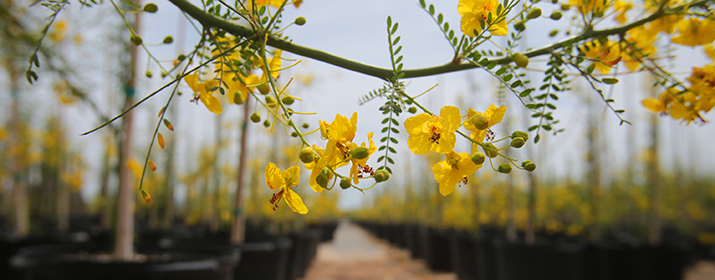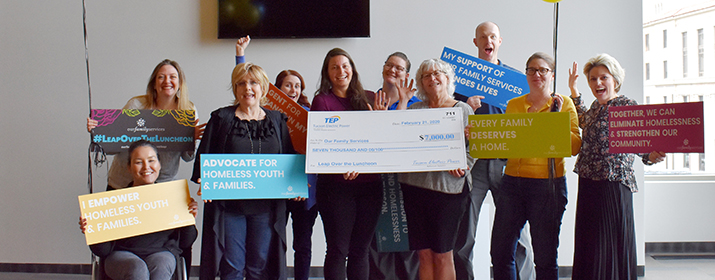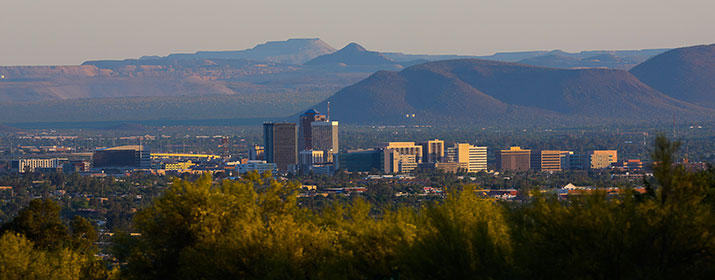
On a plot of land next to Tucson Electric Power’s H. Wilson Sundt Generating Station, green-waste compost from tree trimmings forms neat dark-brown rows.
The mulch — carefully chipped and composted with bacteria — is destined for the Civano Nursery farm in Sahuarita, where it will help grow trees, shrubs and perennials that will be planted throughout Pima County.
TEP and Civano Nursery have worked together for 14 years to recycle green waste clipped from around power lines. The partnership each year keeps about 30,000 cubic yards of tree branches, leaves and other waste from local landfills. The companies, in turn, donate mulch and trees to charities, schools, hospitals and the nursery, benefiting the Tucson community.
“I tip my hat to Tucson Electric Power. TEP is a good community steward,” said Les Shipley, who founded Civano Nursery in the late 1990s and owns it with his three sons, Chris, Nick and Alex. “Instead of discarding this green waste, we are grinding it, composting it, shipping it down to our nursery and growing more trees.”
The TEP-Civano Nursery relationship is unique. TEP is the first utility in the nation to have a full, successful, robust composting program.
“More and more utilities are starting to compost at least a portion of their green waste, and we are cheering on their success. We are very proud to have helped pioneer such a successful program,” said Jim Bennett, a Maintenance Planner who oversees the Civano partnership. “This is a national treasure.”
Former TEP employee Harold Hummer, who is now retired, initiated the partnership after he spotted Civano Nursery while driving down the Old Nogales Highway in June 2004. At the time, TEP was looking for a company to recycle its green waste, which was gathering in heaps in a corner of its Irvington campus.
Hummer stopped into the nursery, met Alex and Les Shipley, and shortly thereafter, the partnership was formed. Les Shipley knew nothing about composting at the time. “I read every book on composting that I possibly could,” he said. “It’s taken many years to perfect the process, but we did it, and now we have a product that’s one of the best in the industry.”
Civano recently won Greenhouse Grower’s 2018 Medal of Excellence Award for its sustainable practices, including its work with TEP.
Green waste is brought to the mulch yard by Asplundh Tree Expert Co. and Tony & Sons Landscaping. Their workers cut branches away from power lines and clear easements throughout the greater Tucson area.
First, the clippings go through a grinder and are mixed with water and a bacteria inoculant. After a second grinding, the material is shaped into long rows, where the composting process is helped along with a special machine that keeps it aerated and moist. The process takes about six weeks to complete.
About 12,000 cubic yards of the finished mulch is shipped to Civano Nursery annually. With it, Civano grows close to a half-million trees, shrubs and perennials each year. About 95 percent of the plants grown at Civano Nursery are planted in Pima County. The nursery supplies plants to 300 to 400 local landscapers.
Since the program started, Civano has invested about $1.5 million in new machinery and equipment to improve the green-waste grinding and process.
“It’s important for us to run an efficient and safe yard,” Shipley said.
The endeavor also promotes efficiency at TEP because the company doesn’t have to bring green waste to the landfill, a wasteful, expensive and time-consuming process.
“It’s probably the best compost in the United States. We’re proud of our work with Civano,” Bennett said.
In addition to composting, TEP partners with Civano on the Trees for You program in which TEP customers can purchase discounted shade trees to save energy.






